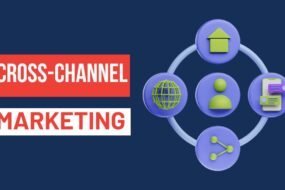
In today’s rapidly evolving business landscape, mastering the art of B2B marketing has become paramount for companies seeking sustainable growth and staying ahead of their competitors.
B2B marketing, short for Business-to-Business marketing, is a multifaceted discipline that requires a deep understanding of critical concepts and overcoming unique challenges. This article explores the core principles and essential strategies that can lead to successful B2B marketing outcomes.
Effective B2B marketing is more than merely an option; thriving in the competitive business arena is necessary. A well-executed B2B marketing strategy can lead to increased brand recognition, higher lead generation, improved customer Devotion, and a favorable influence on financial outcomes. Conversely, a lackluster approach may result in wasted resources, missed opportunities, and reduced market presence.
What Is B2B Marketing?
B2B marketing, or business-to-business marketing, promotes products or services from one business to another. Unlike B2C (business-to-consumer) marketing, B2B marketing targets other companies and organizations as customers.
The primary goal is to create strong relationships, address specific business needs, and offer value-driven solutions. B2B marketers utilize various channels like content marketing, email campaigns, social media, and industry events to reach their target audience. The focus lies in delivering relevant and valuable information, building trust, and ultimately fostering long-term partnerships that benefit both parties involved in the business transaction.
Here Are Some B2B Marketing Strategies For SaaS Businesses
In the B2B world, where business-to-business relationships are built on trust, proven products and services, and brand loyalty, it’s nearly impossible to make a sale without direct marketing. Direct marketing is the only form of business-sales lead generation that is crucial to the success of B2B businesses. Here are the top B2B marketing strategies for SaaS businesses to consider:
Know Your Target Audience
- Defining Your Ideal B2B Customers: To succeed in B2B marketing, it is crucial to have a clear understanding of your target audience. Identify the industries, company sizes, and job roles that align with your products or services. Perform comprehensive market research to acquire insights into your industry or target audience’s potential client’s needs, pain points, and preferences.
- Conducting Market Research: It is the foundation of effective B2B marketing. Dive deep into your industry to gather data on market trends, competitor analysis, and emerging trends. This data will inform your marketing choices and assist you in capitalizing on opportunities. Stay ahead of the curve.
- Creating Buyer Personas for Precise Targeting: Developing detailed buyer personas enables you to customize your marketing endeavors. Grasp your customers’ motivations, challenges, and objectives to adapt your messaging and content for optimal effectiveness.

Crafting A Solid Marketing Strategy
- Setting Clear and Measurable Goals: Outline and establish specific and measurable marketing objectives that align with your business goals.Whether it’s lead generation, brand awareness, or customer retention, having clear goals will keep your marketing team focused and accountable.
- Identifying Key Performance Indicators (KPIs): Select relevant KPIs. Monitor the performance of your B2B marketing campaigns by tracking key metrics, including conversion rates, customer acquisition costs, and ROI. These metrics offer valuable insights into the efficiency of your strategies.
- Aligning Marketing Strategy with Business Objectives: Ensure your marketing strategy complements your objectives. Every marketing initiative should contribute to the overall growth and success of the organization.
Building A Strong Brand Identity
- Establishing a Unique Value Proposition: Differentiate your B2B brand by highlighting your unique value proposition. Convey the distinctive qualities that differentiate your products or services from competitors and why potential clients should choose you.
- Designing a Memorable Brand Logo and Slogan: A visually appealing and meaningful brand logo coupled with a memorable slogan creates a lasting impression in the minds of your audience. Invest in professional design to convey the right brand image.
- Consistency in Branding Across All Channels: Maintain consistency in branding across all marketing channels and touchpoints. A consistent brand identity fosters trust and recognition, whether it’s your website, social media, or offline materials.
Content Marketing For B2B Success

- Creating Engaging and Informative Content: It’s a powerful tool in B2B marketing. Produce high-quality content that educates and provides value to your target audience. Develop blog posts, whitepapers, ebooks, and guides that address their pain points and challenges.
- Utilizing Different Content Formats (Blogs, Videos, Infographics): Diversify your content formats to cater to various audience preferences. While some prefer reading blogs, others may engage better with videos or infographics.
- Incorporating SEO Best Practices for Increased Visibility: Enhance and optimize your content for search engines to enhance organic visibility. Keyword research, on-page optimization, and link-building strategies are crucial in generating organic traffic to your website.
Embracing Thought Leadership
- Establishing Industry Authority: Position your brand as a thought leader. Share valuable insights, industry trends, and expert opinions. Establishing credibility and trust with your audience.
- Publishing High-Quality Thought Leadership Content: Consistently publish authoritative and well-researched content to reinforce your position as a thought leader. This could include research reports, industry analysis, and data-driven content.
- Leveraging Guest Posting and Industry Collaborations: Expand your reach by collaborating with other thought leaders or industry influencers. Guest posting on reputable platforms can expose your brand to a broader audience and strengthen your authority.
Leveraging Social Media Platforms
- Identifying the Right Social Media Channels: Focus your efforts on social media platforms most relevant to your B2B audience. LinkedIn, Twitter, and industry-specific forums are often ideal for B2B marketing.
- Engaging with the B2B Audience on Social Media: Connect with your audience through consistent updates. Engage in social media platforms through comment responses and discussions. Relevant discussions. Cultivate connections and nurture a community atmosphere around your brand.
- Using Social Media Advertising for Lead Generation: Leverage social media advertising to target specific B2B decision-makers and generate leads. Utilize audience segmentation and tailored ad content to maximize the impact of your campaigns.
Personalization In B2B Marketing
- Implementing Personalized Email Campaigns: Segment your email lists. Develop customized email campaigns by tailoring content to user behavior, preferences, and past interactions. Emails personalized in this manner tend to achieve higher open and click-through rates.
- Customizing Website Experience for Individual Users: Utilize data and user behavior to personalize the website experience for individual users. Tailor content and offers based on their interests and previous interactions to enhance engagement and conversion rates.
Utilizing Account-Based Marketing (ABM) Strategies
- Understanding the ABM Approach: Account-based marketing targets Target specific high-value accounts instead of employing a broad approach. Understand the nuances of ABM and how it aligns with your business goals.
- They are tailoring Marketing Efforts to Specific Accounts: Craft personalized marketing campaigns for each targeted account. Comprehend their challenges and requirements, and customize your approach to meet their messaging accordingly.
- Measuring and Analyzing ABM Success: Establish critical metrics. Measure the effectiveness of your ABM initiatives by monitoring progress, identifying opportunities, and continuously refining your strategies.
Leveraging Data And Analytics

- Collecting Relevant B2B Marketing Data: Invest in data collection and analytics tools to gather relevant insights on your audience, campaign performance, and market trends.
- Analyzing Data for Insights and Optimization: Leverage data analysis to gain actionable insights. Apply these insights to improve your marketing strategies and improve overall performance.
- Data-Driven Decision-Making in B2B Marketing: Base your marketing decisions on data rather than intuition. Data-driven decision-making reduces the risk of ineffective strategies and enhances overall marketing success.
Building Trust With Social Proof
- Showcasing Customer Testimonials and Case Studies: Utilize testimonials and case studies from content clients. Establish trust and showcase the efficacy of your products or services.
- Highlighting Industry Awards and Recognition: Display any industry awards or recognition your company has received. This adds credibility and validates your expertise in the field.
- Utilizing Trust Seals and Certifications: Include trust seals and certifications on your website to assure potential clients that your business adheres to industry standards and best practices.
Seamless Sales And Marketing Alignment
- Fostering Collaboration between Sales and Marketing Teams: Facilitate open communication and collaboration between the Collaborate between sales and marketing teams to guarantee a cohesive approach to lead generation and conversion.
- Creating Shared Goals and Metrics: Establish shared goals and metrics for both teams, fostering a sense of accountability and responsibility for the organization’s overall success.
- Implementing Closed-Loop Reporting for Better Insights: Integrate sales and marketing data to gain a complete picture of the customer journey. Closed-loop reporting allows you to measure the impact of marketing efforts on sales and revenue.
Tracking And Measuring B2B Marketing Performance
- Setting up Marketing Analytics Tools: Invest in robust marketing analytics tools for monitoring and tracking the performance of your marketing initiatives effectively.
- Monitoring Key Metrics Regularly: Examine essential metrics to discern trends, patterns, and opportunities for enhancement.
- Identifying Areas for Improvement and Growth: Use the insights gained from analytics to make data-driven improvements to your B2B marketing strategies and drive continuous growth.
Staying Updated On Industry Trends

- Following B2B Marketing Thought Leaders: Stay abreast of the latest trends and best practices by following industry thought leaders and experts.
- Attending Industry Conferences and Events: Engage in industry conferences, webinars, and events to gain valuable insights, network with peers, and stay informed on emerging trends.
- Subscribing to Industry Publications and Newsletters: Subscribe to industry publications, blogs, and newsletters to receive frequent updates and stay at the forefront of developments in B2B marketing.
The Major B2B Marketing Trends
As of 2023, major B2B marketing trends include personalized and account-based marketing, emphasizing tailored experiences. Content marketing and thought leadership remain vital for brand authority and prospect engagement.
Video marketing gains momentum for product demonstrations and educational content. Influencer marketing expands to boost brand visibility. Social media remains a prominent channel, with LinkedIn being popular. Data-driven marketing and AI analytics provide valuable customer insights.
Customer experience (CX) takes precedence for improved retention and conversion rates. Chatbots and conversational marketing enhance real-time support. Virtual events and webinars continue to thrive for flexible networking. Sustainability and CSR efforts appeal to socially conscious B2B consumers. Adapting to evolving technology and consumer preferences is crucial for sustained success.
Overcoming Common B2B Marketing Challenges
Within the dynamic realm of B2B marketing, enterprises frequently confront diverse challenges that may impede their success. Addressing these challenges strategically is crucial for maintaining a competitive edge and achieving marketing objectives. Here are some common B2B marketing challenges and effective ways to overcome them:
- Long Sales Cycles: B2B sales cycles are longer due to complex decision-making processes and multiple stakeholders. To overcome this challenge, build strong relationships with prospects, provide valuable content throughout the buyer’s journey, and implement lead nurturing campaigns. Utilize marketing automation to deliver personalized content to prospects at the right time.
- Lead Generation and Quality: Generating high-quality leads is a persistent challenge for B2B marketers. Optimize landing pages and forms for better conversions to enhance lead generation, create compelling gated content offers, and effectively utilize social media and search engine marketing. Additionally, collaborate closely with the sales team to ensure lead qualification criteria align with marketing efforts.
- Account-Based Marketing Implementation: Implementing Account-Based Marketing (ABM) requires a shift in mindset and a collaborative effort between marketing and sales teams. Start by identifying high-value target accounts, personalizing marketing efforts to address their specific needs, and measuring the impact of ABM strategies accurately. Consistent communication and coordination between marketing and sales are crucial for successful ABM execution.
- Proving Marketing ROI: Demonstrating the ROI of marketing efforts is essential for securing budget and resources. Implement marketing analytics tools to track and measure key performance indicators (KPIs). Utilize closed-loop reporting to connect marketing activities to actual revenue and business outcomes—present data-driven insights to stakeholders to showcase the impact of marketing on the bottom line.
- Content Marketing Challenges: Creating valuable and engaging content consistently can be challenging. Develop a content strategy aligned with buyer personas and target industries. Leverage customer feedback and market research to pinpoint content topics that resonate with your audience. Repurpose content in various formats to maximize reach and impact.
- Standing Out in a Crowded Market: B2B markets are often saturated, making it challenging to differentiate from competitors. Create a distinctive value proposition that caters to Identifying the particular pain points of your target audience. Showcase thought leadership through high-quality content and authoritative industry insights. Utilize customer testimonials and case studies as tools to establish trust and credibility.
- Adapting to Technological Advances: With rapid technological advancements, B2B marketers must stay up-to-date with new tools and platforms. Invest in marketing automation, artificial intelligence, and data analytics to streamline processes and gain valuable customer insights. Keep up to date with emerging technologies that can enhance your marketing efforts.
- Global Marketing and Localization: Expanding into international markets presents challenges related to cultural nuances, language barriers, and regional preferences. Tailor marketing messages and content to suit the local audience. Partner with in-country experts or utilize translation services to ensure accurate localization.
- Measuring Multi-Channel Marketing Impact: B2B marketing often involves Conversations that are challenging to attribute accurately due to engagement across various channels. Implement multi-channel attribution models to understand the contribution of each channel in the buyer’s journey. Utilize UTM parameters and track conversions across different touchpoints.
- Staying Compliant with Regulations: B2B marketers must adhere to various regulations, such as GDPR and CCPA, to protect customer data and privacy. Invest in robust data security measures and ensure compliance with relevant laws. Obtain explicit consent for marketing communications and provide easy opt-out options for recipients.
In conclusion, successful B2B marketing requires a proactive approach to tackle the challenges that arise. By implementing data-driven strategies, fostering collaboration between teams, and staying informed about industry trends, businesses can overcome obstacles and achieve sustainable growth in the B2B market.
Conclusion
In conclusion, successful B2B marketing Demands a strategic Requires a strategic method and a comprehensive understanding of the target audience. Focus on building solid relationships, leveraging personalized content, and demonstrating the unique value of your products or services. Embrace data-driven insights to refine your strategies continually and stay agile in the ever-evolving market. Leverage social media, email marketing, and additional digital marketing. Utilize various channels to broaden your reach and interact with prospects. Nurture leads with compelling and informative content throughout the buyer’s journey. Lastly, prioritize customer satisfaction and feedback, as positive word-of-mouth and reputation are crucial in sustaining long-term success in the B2B landscape.








No Comments